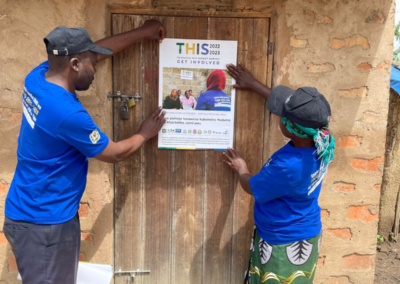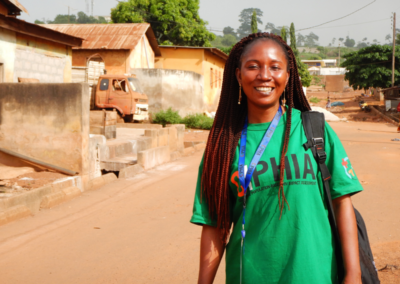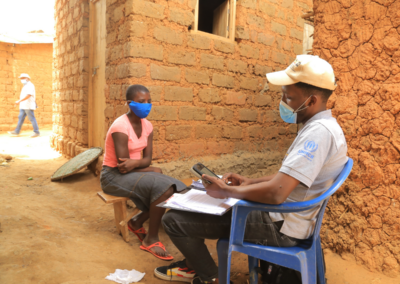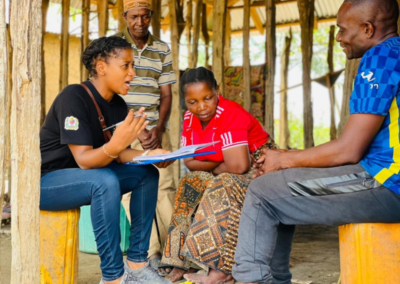While mobile women have an elevated risk of contracting HIV, little research has examined the role of a partner’s mobility on women’s risk or the relationship between mobility and risky sexual behaviors due to household vulnerabilities such as food insecurity.
In a new article – entitled “Associations between mobility, food insecurity and transactional sex among women in cohabitating partnerships: an analysis from six African countries 2016-2017” – researchers at ICAP at Columbia University and elsewhere study this important research gap in six sub-Saharan African countries, uncovering ways in which food insecurity and women’s mobility each increased the probability of transactional sex, a common risk factor for HIV acquisition.
While several studies have looked at how mobile populations are more likely to acquire HIV than permanent residents because of such factors as increased sexual risk behaviors, expanded sexual networks, and the very conditions that instigate their mobility in the first place, this new study, published in the Journal of Acquired Immune Deficiency Syndrome (JAIDS), stands apart by zeroing in on mobility as a key driver of the HIV epidemic in sub-Saharan Africa.
Using Population-based HIV Impact Assessment (PHIA) data collected between 2016 and 2017 in Eswatini, Lesotho, Namibia, Tanzania, Uganda, and Zambia, the study showed that women in households experiencing food insecurity had 1.43 times higher likelihood of engaging in transactional sex compared to women in households with little to no food insecurity.
“One aspect that’s often missing in mobility and HIV research is identifying the reason why individuals or partners are mobile,” said Aleya Khalifa, a PhD candidate in Epidemiology at Columbia University, an ICAP Global HIV Implementation Science Research Training fellow, and the article’s lead author. “Using PHIA data helped us assess multiple dimensions of a person’s experience, such as partner and individual behaviors, as well as household vulnerabilities that drive their mobility, like food insecurity. Going forward, it’s important that population-based surveys continue to look more closely at why people migrate or are mobile because these individuals may have different HIV risk profiles depending on those drivers.”
Overall, 18.2 percent of women lived in households that experienced moderate to severe food insecurity, with the prevalence of food insecurity above 20 percent in Uganda, Namibia, Eswatini, and Lesotho. Among partners in food secure households, the prevalence of transactional sex was significantly higher if the woman or both partners were mobile. Since transactional sex is a common risk factor for HIV acquisition, these findings indicate that mobile women would likely benefit from undisrupted access to HIV prevention and treatment services.
Additionally, while mobile women have been shown to engage in high-risk sexual partnerships, the study extended this finding to women in cohabitating partnerships as well.
“Compared to single women, the risk of transactional sex was significantly reduced for women in cohabitating unions, while the opposite was found for women who were separated, divorced, or widowed,” said Sally Findley, emeritus professor of Population and Family Health, former ICAP senior advisor for Capacity Building for the PHIA surveys, and an author of the publication. “These findings show how women’s partnerships can help them cope with the ups and downs of food availability, contrasting sharply with the situation of women on their own after marriage, who appear to have fewer options when faced with a food shortage.”
Research addressing the nexus of food security and health is vital against the current backdrop of a changing climate. As climate change persists, unpredictable weather patterns will continue to impact food insecurity in eastern and southern Africa, leading to both short- and long-term migration. As sub-Saharan African countries strive to end the HIV epidemic, this study underlines the need for integrated interventions like food assistance programs paired with enhanced access to HIV prevention methods, HIV testing, and antiretroviral treatment (ART) for mobile men and women.
“Given that sub-Saharan African countries are disproportionately impacted by climate change, particularly in the countries with the highest burden of HIV,” said Andrea Low, ICAP HIV clinical and scientific director and an author of the publication, “these study results could mean that HIV risk will worsen as people are displaced due to poverty or food insecurity, and epidemic control will become much harder.”
While HIV prevention programs can tailor prevention, testing, and treatment services through such initiatives as long-acting pre-exposure prophylaxis (PrEP), there is a demand for extending these services more broadly to mobile populations, especially women. Testing strategies such as mobile health (mHealth) applications, leveraging of social networks, and enhanced community-based linkage to care will be critical in reaching mobile populations where they are.
“In our search for how food insecurity impacts a person’s overall livelihood, I think we will see that it is just one of many household-level vulnerabilities that can impact someone’s HIV risk profile,” added Khalifa. “As we continue to work towards HIV epidemic control, it’s imperative that we study the structural drivers of HIV risk and focus on multi-level interventions instead of individual behavioral change interventions.”
The PHIA project is an effort led by the Ministry of Health in each participating country and funded by the U.S. President’s Emergency Plan for AIDS Relief (PEPFAR) through the U.S. Centers for Disease Control and Prevention (CDC) with technical support from ICAP.










